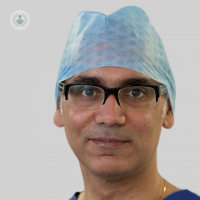What is Aquablation of the prostate using the AquaBeam system?
Written by:Benign prostate enlargement, also known as benign prostatic hyperplasia, is a common problem experienced by men as they age. Symptoms are generally urinary in nature, causing problems such as urinary incontinence, difficulty urinating or urinary urgency. The good news is that benign prostate enlargement is very treatable. Mr Sarb Sandhu, a top urologist, describes the Aquablation and AquaBeam approach which offers a less invasive means of treating this condition.

How is benign prostate enlargement usually treated?
For many men that need surgery to treat their symptoms related to benign prostate disease, the best option for them is an operation that removes tissue to maximally improve their flow and maximally dis-obstruct the bladder. The standard procedures used to treat benign prostate enlargement, such as TURP or laser prostatectomy, are associated with a potential risk upon sexual function, in terms of dry ejaculation, with rates ranging from 40 to 60 or 70%. There is also a small risk of altered erectile function. These procedures are technically challenging, some more than others, and many tests need to be performed before you can be considered proficient.
What are Aquablation and AquaBeam?
Aquablation to the prostate using the AquaBeam system is the first procedure looking to copy the concept of removing the tissue, or coring out the prostate, to improve symptoms. However, it does not rely on surgical skills to the same extent. It is an ultrasound-guided, robotically-delivered treatment, which ensures reproducible outcomes in terms of tissue removal because the procedure is planned on the ultrasound and delivered by the robot.
What are the benefits of Aquablation with AquaBeam?
The procedure is rapid and is not affected by the size of the prostate. It is easily taught and associated with a single night or perhaps two days in hospital where any postoperative bleeding settles itself down.
It is unique in that no heat is employed to try to achieve haemostasis, that is, to stop bleeding from the prostate. As a result, it seems to be associated with a more rapid return to normal activities and settling of symptoms compared to more standard approaches. More particularly, however, a randomised study has demonstrated that this novel procedure is associated with a much lower risk of developing dry ejaculation, rather than 60-70% described with more standard procedures, the rate reported in this study was 7%.
This novel procedure, therefore, offers men the same kind of symptom improvement as standard operations, but with a much lower risk of deleterious effects upon sexual function.
If you are suffering from symptoms related to benign prostate enlargement, make an appointment with Mr Sarb Sandhu today via his Top Doctors profile.


